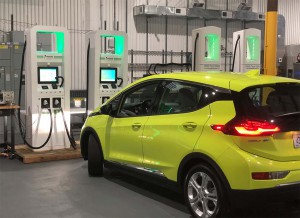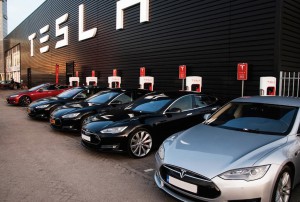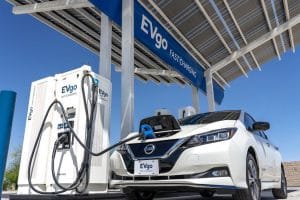
GM and Bechtel are looking for investors that will fund a large expansion of the nation’s EV fast-charging network.
General Motors’ electric vehicle plans rely on a variety of factors to be successful, not the least of which is a massive nationwide network of fast-charging electric stations for its coming fleet of battery-electric vehicles. The question on GM’s mind: who will pay for it? Not GM.
The company is already paired up with Bechtel Corp., a construction company, to form a joint venture, but officials confirmed the duo are looking for investors to fund the construction and installation of chargers for use with the Chevy Bolt as well as GM’s future vehicles.
“We don’t wish to spend our capital to build fast chargers,” Mike Ableson, GM’s vice president, electric vehicle charging and infrastructure, said Wednesday at the CAR Management Briefing Seminars in Traverse City, Michigan. “We wish to spend our capital to build more EVs.”
(GM, Bechtel Planning JV to Create New EV Charging Network)
When GM and Bechtel announced their initial tie-up in late May, they said they would be searching for additional investors. Ableson said that no new investors have signed on in the interim, but said the companies are “quite confident we can get interest from outside investors,” according to the Automotive News.
On the surface, GM’s push to get investors to pay for the charging network needed to make its products successful may look almost entitled. However, there is no “standard” way for expanding the network of chargers.
Nissan has partnered with EVgo, announcing Wednesday the installation of 200 new fast-chargers across the country. The two also set up nine charging stations along a 500-mile corridor between Boston and Washington D.C.
Electrify America is set to spend $500 million to create a network of chargers across the country. The company was created by Volkswagen AG as part of its penalty for its dieselgate scandal. Even GM has partnered with charging companies.
The company teamed with EVgo, ChargePoint and Greenlots to access the largest collective electric vehicle charging network in the U.S., which includes more than 31,000 charging ports. GM plans to aggregate dynamic data from each of the EV charging networks so owners of the all-electric Bolt can have “a more seamless charging experience” with their vehicles.
Tesla is basically the only company with a national network of fast chargers. It built them and is expanding them regularly, but they’re not currently available to other automakers’ vehicles.
(Nissan, EVgo Growing Again, Adding 200 New EV Charging Stations)
That said, the leading seller of EVs recently made it possible for Model 3 owners to also use CHAdeMO adapters too. The company’s Model S and Model X vehicles were already able to use the chargers. However, in addition to Tesla’s proprietary connector, there is also CCS connector used by Nissan and others.
Automakers have long bemoaned the lack of infrastructure for EVs. In fact, Ableson made note of that during his presentation on Wednesday.
While there are already several thousand charging stations across the country, they are dwarfed by gas stations. There are somewhere on the order of 120,000 gas stations in the United States, according to industry data. The question is whether we will need to essentially duplicate that vast and convenient network with charging stations.
The advantage to EVs is that they can be charged using home and work chargers, which makes sense because that’s where EVs spend a majority of their time, said Ableson, according to Automotive News. In fact, Electrify America estimates 80% of all charging occurs at home.

Finding places for the superchargers for Tesla’s fleet isn’t too difficult. The car will find a charging station for the driver.
Also mitigating the issue is the fact that many of the charging companies are forming partnerships to allow users to plug in at more stations. Electrify America and ChargePoint today announced a roaming partnership that will let their customers plug in at each other’s stations and not have to pay additional fees or set up separate accounts.
The move could mean substantial savings while also making it easier to find a place to plug in. Together, the two companies already operate more than 30,000 Level 2 and Level 3 quick chargers across the U.S., with thousands more expected to open in just the next year.
(Two Major Public Charging Companies Team Up)
Such “interoperability” agreements are becoming more common. ChargePoint announced one such deal with several competitors in November 2017, while Electrify America revealed a similar approach with EV Connect, Greenlots and SemaConnect last October.

